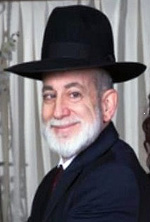More than Enough is Nothing!
By Rabbi Yaakov Marks

SAN DIEGO — Yaakov had just left his parent’s home and his birthplace to journey to a foreign land in search of a wife. An encounter with Eliphaz, the first-born son of Esau, had left him penniless. Early darkness forced him to camp in an unfamiliar place. In his sleep that night he had a vision of G-d guaranteeing his safety and his future generations’ inheritance of the Land of Israel. Upon awaking, Yaakov realized the awesome holiness of the place where he had slept. He set up an altar and made an offering to G-d. Reading this today, we can’t begin to fathom the plethora of emotions, dreams, doubts, and concerns that Yaakov experienced for himself and for the future his descendants.
Yaakov made a covenant with G-d. According to many commentators, this was not only a personal commitment; it would be an eternal covenant and guarantee between G-d and all of Yaakov’s future generations. Imagine the tremendous ramifications that this eternal pact will have on all of his future family. Yaakov turned to G-d and said, “Watch me on my journey. Give me bread to eat and clothes to wear, and return me in peace to my father’s house.”
Is this all that Yaakov could wish for his future generations? Bread to eat and clothes to wear! If you were a parent asking a King to help your children, wouldn’t you ask for an abundance of wealth, the best land, health, and happiness? You would ask that your child is blessed with wisdom, fulfillment, and success. Why is Yaakov asking only for bread and clothing? Why does he add the words ‘to eat’ and ‘to wear’? What else do you do with bread and clothing? What is Yaakov really requesting for his future generations?
When we examine Yaakov’s request, we see the tremendous insight, blessing, and love embedded in his request.
Yaakov said “food to eat” so that we should be blessed with good health and peace of mind so that when we eat, we should enjoy our food. He said “clothes to wear” so that we should be blessed with health and physical well-being so that we get dressed by ourselves each day and so that our clothing brings us pleasure. In poor health, a person sometimes is unable to eat, and even when they can manage to do so, they don’t enjoy eating their food. They sometimes cannot get dressed, and when they do, they sometimes don’t derive pleasure from their efforts.
Yaakov said “food to eat” and “clothes to wear” so that we should be blessed with all the necessities which we require and they should be lovingly granted by G-d without worry. Yaakov is teaching us a tremendous life lesson. True happiness is when a person has all that he needs. Having a lot of extra money in the bank, houses around the world, and an abundance of possessions doesn’t add to true happiness. So many people waste the precious time of their life working for things they don’t need. All too often over-abundance is used improperly, bringing despair and disaster. Overeating brings absolutely no benefit to a person. It’s only through the conscious act of using wealth properly that true happiness is experienced
.
Yaakov is blessing us so that when we eat that our minds should be in control and not our emotions. We should eat and enjoy all that we need “to eat.” Can a person who can’t control his eating experience true satisfaction from eating? The commentaries go farther and say that a person should eat his food and the food should not eat the person. The Chovot HaLevavot uses a very strong language. He says anyone who constantly goes over the boundary of satiety and puts effort into working for this “pleasure” is putting aside his service of G-d and making his stomach his god. Those people who eat only to have the strength to do good are blessed.
In those few simple words, Yaakov is extending a magnificent blessing to his children. May we have health, peace of mind, and all our needs lovingly granted by G-d. May we not be burdened with distractions so we can use our precious time doing the things that are truly valuable and important to us. May we always maintain control of ourselves and have no physical addictions. May we all be blessed with our father Yaakov’s blessing.
*
Rabbi Marks is a life and health coach, who may be contacted via ahealthyrabbi@gmail.com.